
Horsepower (hp) is a unit of measurement of power, or the rate at which work is done, usually in reference to the output of engines or motors. There are many different standards and types of horsepower. Two common definitions used today are the mechanical horsepower, which is about 745.7 watts and the metric horsepower, which is approximately 735.5 watts.

A tractor is an engineering vehicle specifically designed to deliver a high tractive effort at slow speeds, for the purposes of hauling a trailer or machinery such as that used in agriculture, mining or construction. Most commonly, the term is used to describe a farm vehicle that provides the power and traction to mechanize agricultural tasks, especially tillage, but nowadays a great variety of tasks. Agricultural implements may be towed behind or mounted on the tractor, and the tractor may also provide a source of power if the implement is mechanised.
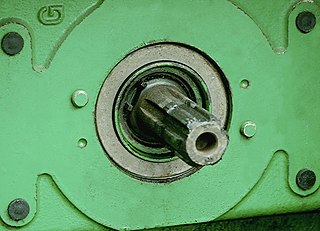
A power take-off or power takeoff (PTO) is any of several methods for taking power from a power source, such as a running engine, and transmitting it to an application such as an attached implement or separate machine.

A cultivator is an agricultural equipment used for secondary tillage. One sense of the name refers to frames with teeth that pierce the soil as they are dragged through it linearly. Another sense refers to machines that use rotary motion of disks or teeth to accomplish a similar result. The rotary tiller is a principal example.
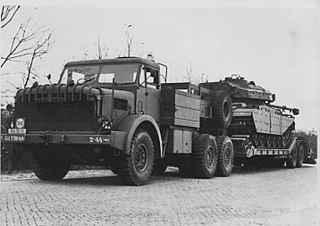
The Mighty Antar was a heavy-duty 6×4 tractor unit built by Thornycroft from the late 1940s onwards. For some decades it was the standard tank transporter of the British Army and was also used by other nations. It was powered by a shortened V8 land version of the V12 Merlin Aircraft engine modified to run on diesel and known as the Rolls-Royce Meteorite.

Minneapolis-Moline was a large tractor and farm and industrial machinery producer based in Hopkins, Minnesota. It was the product of a merger of three companies in 1929: Minneapolis Steel & Machinery (MSM) which was noted for its Twin City tractors, Minneapolis Threshing Machine Company (MTMC) which also produced Minneapolis tractors, and Moline Plow Company. It had manufacturing facilities on Lake Street at Hiawatha Avenue in Minneapolis, MN, in Hopkins, MN and in Moline, IL.
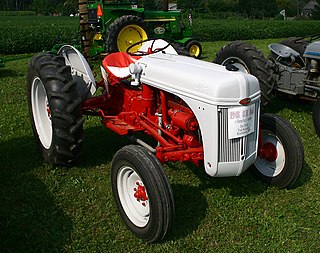
The Ford N-series tractors were a line of farm tractors produced by Ford between 1939 and 1952, spanning the 9N, 2N, and 8N models.

The Avery Company, founded by Robert Hanneman Avery, was an American farm tractor manufacturer famed for its undermounted engine which resembled a railroad engine more than a conventional farm steam engine. Avery founded the farm implement business after the Civil War. His company built a large line of products, including steam engines, beginning in 1891. The company started with a return flue design and later adapted the undermount style, including a bulldog design on the smokebox door. Their design was well received by farmers in central Illinois. They expanded their market nationwide and overseas until the 1920s, when they failed to innovate and the company faltered. They manufactured trucks for a period of time, and then automobiles. until they finally succumbed to an agricultural crisis and the Depression.

Two-wheel tractor or walking tractor are generic terms understood in the US and in parts of Europe to represent a single-axle tractor, which is a tractor with one axle, self-powered and self-propelled, which can pull and power various farm implements such as a trailer, cultivator or harrow, a plough, or various seeders and harvesters. The operator usually walks behind it or rides the implement being towed. Similar terms are mistakenly applied to the household rotary tiller or power tiller; although these may be wheeled and/or self-propelled, they are not tailored for towing implements. A two-wheeled tractor specializes in pulling any of numerous types of implements, whereas rotary tillers specialize in soil tillage with their dedicated digging tools. This article concerns two-wheeled tractors as distinguished from such tillers.
Allwork tractors were manufactured by the Electric Wheel Company of Quincy, Illinois. Electric Wheel Co. was acquired by the Firestone Tire and Rubber Company. The All Work II Model F was a lightweight tractor with a big surplus of power for general farming and orchard work. This tractor was fueled by kerosene.

Cockshutt was a large tractor and machinery manufacturer, known as Cockshutt Farm Equipment Limited (1957–1962), based in Brantford, Ontario, Canada.

The Farmall Cub or International Cub was the smallest tractor manufactured by International Harvester (IH) under either the McCormick-Deering, Farmall, or International names from 1947 through 1979 in Louisville, Kentucky.
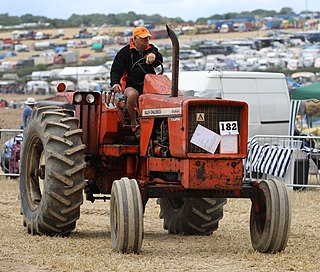
The Allis-Chalmers 190XT, also known as the One-Ninety XT, is a row crop tractor produced by Allis Chalmers from 1964 to 1971. The tractors are powered by diesel fuel, gasoline, or LP gas. As its model number implies, it was based on the Allis-Chalmers D19, though it featured many alterations and improvements over the D19. The only difference between the 190 and the 190XT is the addition of a turbocharger on the 190XT diesels. Gasoline-run 190XT's also have a G2800 engine as opposed to the 190's G2500 engine. The stock 190XT is rated at about 93 PTO horsepower.
The Advance Motor Manufacturing Company was a British motorcycle and engine manufacturer established in 1905. As well as supplying aircraft engines to the pioneering monoplane developers, Advance engines were also used by Captain Robert Scott to power Antarctic snow sleds. After the end of the Second World War the company was sold to Sheepbridge Engineering and became a motor supplies organisation.

The Allis-Chalmers D series is a line of tractors made by the Allis-Chalmers Manufacturing Company from 1957 to 1969. Most of the D-series tractors, except for the D21, had hand-operated, shift-on-the-go oil clutches, commonly referred to as a hand clutch. Allis-Chalmers marketed this arrangement as the "Power Director". This clutch was in low range when pulled back, neutral in the middle, and high range when pushed forward. It could also be ordered as a forward-reverser, called the "Shuttle Clutch". This hand clutch also exists on the D21, but it was not meant for shifting on the go.

The Model G is a small implement carrier tractor that was made by the Allis-Chalmers Manufacturing Company. At the time of its introduction the Model G was unique for its rear-mounted, Continental N62 engine. It was a four-cylinder engine with a 2⅜ × 3½ inch bore and stroke. The Model G was designed for small farms and vegetable gardeners, and a line of implements specifically designed for it, including ploughs, planters, and cultivators. The design of the Model G allowed for a great view of the belly-mounted implements.
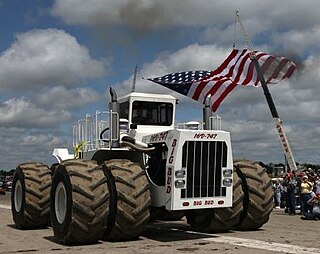
The Big Bud 747 or 16V-747 Big Bud is a large, factory build, production tractor built in Havre, Montana, in 1977. It has 1100 horsepower. It is the "World's Largest Farm Tractor". It is about twice the size of many of the largest production tractors in the world, depending on parameter.

The Model WC was a tractor made by Allis-Chalmers from 1933 to 1948. The WC was designed from its start as a nimble, low-cost, but well-powered row-crop tractor that would make the best use of pneumatic rubber tires, which Allis-Chalmers had just introduced to agriculture in 1932. A successful model at the historical height of row-crop tractor demand, the WC was the best-selling tractor model that Allis-Chalmers ever built.
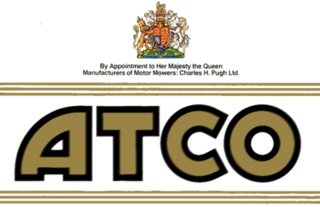
Atco Limited was a British mower company which traded as "Atco Ltd" from 1981 to 1990, making lawn mowers and garden tools. It sold a range of lawn mowers including lawn and garden tractors.

















